-
RAISING COLORS/VOLONTAIRE (Hélène Fillières 2018)
HELENE FILLIÈRES: RAISING COLORS/VOLONTAIRE (2018)
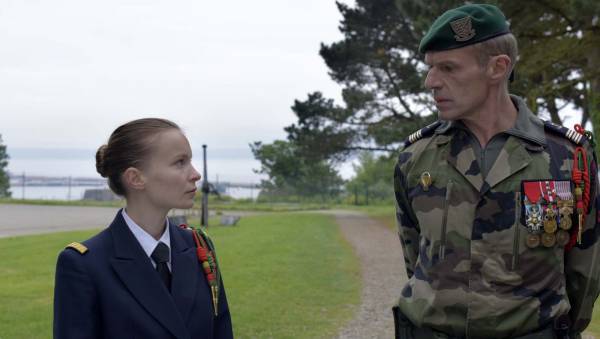
DIANE ROUXEL AND LAMBERT WILSON IN RAISING COLORS
Tough little "meuf"
Raising Colors is a beautifully produced, atmospheric and well cast film, even if it's finally not altogether satisfying. The subject is a highly educated young woman who challenges herself (and provides us with entertainment) by joining the French Navy. Laure (Diane Rouxel) is twenty-two and comes from a liberal Paris family and has a Masters from the Sorbonne in both Russian and English. Lacking other job prospects, and perhaps to be provocative to her family, she takes the offer of a military job. Little Laure thus displeases the big lady in the family in more ways than one, her famous actress mother (Josiane Balasko) - though mom comes around later when Laure has become a green beret.
Raising Colors affords Diane Rouxel the opportunity to shine. She previously played a struggling juvenile delinquent's girlfriend in Emmanuel Bercot's powerful 2015 film Standing Tall/ La Tête haute (Rendez-Vous 2016). But she was understandably a bit overshadowed there by two powerhouse actors, Catherine Deneuve, as the understanding Juge d'Instruction, and the soon-to-be César-winning "Jeune Espoir Masculin" eighteen-year-old prodigy, Rod Paradot, as her boyfriend. Here the story is all about Laure, her adoption of military discipline, her growing dedication to the Navy corps, and her fascination with her superior officer, played by Lambert Wilson of Beauvois' Of Gods and Men (NYFF 2010), the Matrix sequels, and many other films.
When Laure goes off to serve as a kind of secretary and information officer to the Director of Studies in the Naval Fusiliers, in a room facing Lambert Wilson, there is an excitement about it that makes one want to watch on. But it seems a bit of a leap. Why is she suddenly in a uniform, without our seeing her getting any military training? Did I miss something? But there are other omissions - not much back story about her, or her severe, upright new boss. They call the latter, Commandant Rivière, "le redoutable," or the formidable one, as she learns from her charming fellow trainee, Enseigne de vaisseau Loïc Dumont (Corentin Fila, the breakout star of Téchiné's recent success, Being Seven, a big boy now, this vibrant actor is ready for his own lead role).
Dumont and Laure become friendly right away and he calls her "meuf," slang for girl, subtitled with a logical neutrality here as "dude." Their uncomplicated ease together is explained soon: he's gay. Later, from the chief training officer Albertini (Claire Denis regular Alex Descas), Laure learns (in an anecdote of excessive frankness from an officer to a trainee) he, Albertini, at least calls Rivière "Le Moine," the Monk.
As a citizen critic on IMDb for this film comments from experience as himself a one-time French naval trainee, "the Ecole Navale in Lanveoc always feels too big for the little humans living in it." We feel that. And it's enhanced by repeated scenes of a parade ground by the water where the colors are raised from high above, dwarfing the figures there even more. Scenes at a parade ground where trainees are forced to drop and do forty pushups are a commonplace of such films as this, but as Boyd van Hoeij points out, this film puts its own somewhat dry art house spin on the "G.I. Jane" theme. The scenes here toy with ideas from countless military training films, no doubt including the one with Demi Moore; but toy is the operative word.
The usual story of this kind, for instance - van Hoeij makes the point - would have had Lambert Wilson's part "either been the impossibly demanding boss who is the obstacle that needs to be overcome or the love interest who makes her work impossible." But while Rivière gives off an air of severity, and he and Laure are obviously fascinated with each other, these are just teases. She has a boyfriend, Philippe (Jonathan Couzinie), back home, but may have lost interest in him (as well as in menstruating, which she tries to stop), and she has a sexual interlude with a random young colleague (Igor Kovalsky). But the writing doesn't develop Laure's sexual interests.
Laure does very little actual work at her secretarial job, before she suddenly and inexplicably enters combat training, taking time off from her secretarial duties - which weren't very heavy anyway: there is much more fussing over what uniform she will wear and how she will address her boss and salute him. The filmmakers seem to forget at times that military life is not all about style. Laure does a report, and then Rivière has her translate it into English (later, her Russian is much more severely tested). The real challenge comes when, like her pal Enseigne Dumont, Laure develops a desire to train for the commandos.
The IMDb critic-French naval training vet also commented he "thought a bit less of the commando training part that was a far cry from the very tough reality of it." He points out that "whatever your position is in the navy you will always spend a bit of time on the ships," but in this film that, which"could have added another dimension," "is not the case." No boats in this naval training.
Rivière refuses to allow Laure (actually known in the corps as "La Missy") to enter this training, but she manages to bypass him. There are some tough moments in the training, when she crawls on a rope over a pond and falls, climbing up a heavy rope, and jumping up and over a high barrier. Later an exercise with weapons and a Russian seems expressly invented to challenge her. She seems to have a great deal of difficulty but, the point is, she never gives up. And when her fascinating boss Rivière is no longer a factor, she moves on toward self-realization, with a feminist slant, because girls ("les meufs") aren't usually green berets.
What Fillières succeeds best in conveying in this film aren't the military details at all, but, aided by Rouxel with her limpid, vibrant purity and determination, is her character's fascination with the military life and her temporary idol, "le redoutable" AKA "le Moine," Commandant Rivière. And her purity of dedication. Not only can her commandant be called "The Monk." She seems a bit of a secular nun herself.
Raising Colors/Volontaire, 101 mins., opened in French theaters Jun. 2018; the AlloCiné press rating of 2.7 shows critics were not too impressed in general, though some were positive and many were impressed by the two leads. An IMDb User compared it favorably with [I]G.I. Jane. Screened for this review as part of the 2019 UniFrance-Film Society of Lincoln Center Rendez-Vous with French Cinema, 28 Feb. - 10 Mar. 2019.
Rendez-Vous showtimes:
Friday, March 1, 4:00pm
Sunday, March 3, 5:45pm (Q&A with Hélène Fillières)
Last edited by Chris Knipp; 03-02-2019 at 07:15 AM.
-
WHEN MARGAUX MEETS MARGAUZ/LA BELLE ET LA BELLE (Sophie Fillières 2018)
SOPHIE FILLIÈRES: WHEN MARGAUX MEETS MARGAUX/LA BELLE ET LA BELLE (2018)

SANDRINE KIBERLAIN AND AGATHE BONITZER IN WHEN MARGAUX MEETS MARGAUX
A philosophical fantasy in which a middle-aged woman encounters her earlier self in real life
I was underwhelmed by the director's previous film, If You Don't, I Will/Arrête ou je continue, even though it starred Matthieu Amaric and Emannuelle Devos. But this one charms and captures with its teasing "high concept": the forty-five-year-old Margaux (Sandrine Kiberlain) discovers she is coexisting in time and space with another Margaux (Agathe Bonitzer, daughter of the directer with fellow-director Pascal Bonitzer),who's herself twenty years younger. The older Margaux can foresee what the younger one will do, because she has been there before. But not exactly. The film succeeds and pleased partly because it does not follow out its concept too strictly, and treats its fantasy, if it is that, as one involving real people.
The story blends Thirties rom-com with sci-fi surrealism, casually interwoven in the manner of a sophisticated French sex comedy.
In between the two Margaux to complicate matters and add a gentle element of the unexpected is Marc. He was once older Margaux's lover, and now starts up - maybe - with younger Margaux - only he runs into the older Margaux and he's flirting with both of them. Marc is played by the sublimely assured and sexy Melvil Poupaud, who has been in many, many films most Americans haven't seen, but by the time he starred in one they have seen, Éric Rohmer's A Summer's Tale, in 1996, at twenty-three, had already been in twenty-two movies. Now, wouldn't you know it, he's forty-five! So just the right age for Kiberlain's Margaux, but suave and smooth and youthful enough to make love to (or, she would say, have sex with) Bonitizer's younger version without seeming like a sex offender.
But then Margaux one and two go skiing together, without Marc, who pleads sore muscles. The younger Margaux has a fall and hits her head, and everything changes. We realize the film has a humble and uplifting message. The meeting of the two Margaux has been some serious play, but the more serious play is just beginning, just as the film ends.
When Margaux Meets Margaux/La Belle et la belle, 97 mins., debuted in France 14 Mar. 2018. It also showed in BiFan - Bucheon International Fantastic Film Festival (Korea). Good reviews in France as indicated by a 3.5 AlloCiné press rating (user rating 4.0); Arrête ou je continue got 3.3. from the press.). Jean-Baptiste Morain, the Inrocks reviewer, said it was "perfectly balanced," and Fillières' best of her six films so far. Screened for this review as part of the UniFrance-Film Society of Lincoln Center Rendez-Vous with French Cinema, Mar. 2019.
The third of Fillières' films that I've seen was her 2005 Gentille, at my first Rendez-Vous (Mar. 2006), which I called "amiably ditsy."
Friday, March 1, 6:15pm (Q&A with Sophie Fillières and Agathe Bonitzer)
Wednesday, March 6, 8:45pm
New York Premiere
Last edited by Chris Knipp; 02-27-2019 at 02:16 PM.
-
COINCOIN AND THE EXTRA-HUMANS/COINCOIN ET LES Z'INHUMAINS (Bruno Dumont 2018)
BRUNO DUMONT: COINCOIN AND THE EXTRA-HUMANS/COINCOIN ET LES Z'INHUMAINS (2018)
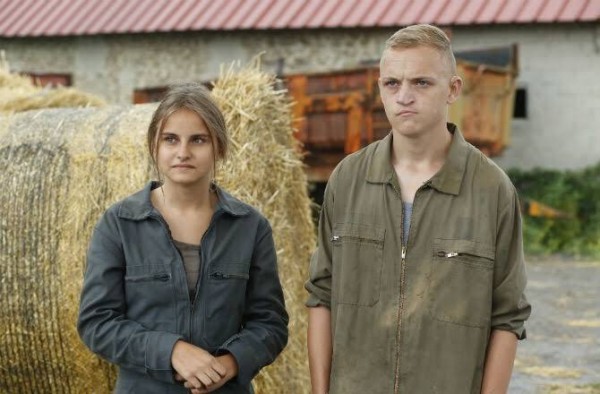
LUCY CARON AND ALANE DELHAYE IN COINCOIN AND THE EXTRA-HUMANS
More life in the northeast from Bruno Dumont
I call your attention to what I wrote about the first 2014 Bruno Dumont miniseries, Lil (or "P'tit") Quinquin (the spelling of his name has been changed to "Coincoin"). Many of the main characters return here, notably the local representatives of the Gendarmerie, Lt. Carpentier (Philippe Jore) and his boss, Cpt. Van der Weyden (Bernard Pruvost), with their peculiarities, particularly Provost's Tourette--like twitches and Jore's far-apart front teeth, and of course Alane Delhaye, who now must be sixteen or so, still with the smashed nose and twisted mouth and hearing aid and basilisk glare, but he's less feisty, calmer, and doesn't throw firecrackers at old people anymore. He still has a high-pitched boyish voice. His girlfriend from before, Eve Terrier (Lucy Caron) now has a mannish girlfriend, Corinne (Priscilla Benoist) who operates a big agricultural machine that opens up like a giant insect. Coincoin gets involved with a new girl called Jenny (Alexia Depret), but she toys with him. It's complicated with girls, he says. He still has a moment or two with Eve, who may long for her innocent time with Li'l Quinquin. This series is just as annoying and repetitious, as well done, and as curiously endearing as the first one.
Now other things are going on: principally, muck falling from the heavens, constituting a kind of alien invasion; a unit of a right-wing party that Coincoin and his sidekick Fatso (L'gros, Julien Bodard) do illicit publicity for in town; and, hovering around the outskirts, African refugees. The extraterrestrial effluvia is thick and oily. Cpt. Van der Weyden calls in forensics to analyze it, and they find it's not only alien but alive. It has a tendency to fall down on Van der Weyden's and Carpentier's and some other people's heads at inopportune moments. And then sometimes it sends a flash of light out over people and knocks them down, whereupon they swell up and give birth to a clone of themselves. At first it just seems some of the locals have spawned identical twins. Van der Weyden insists on calling them "clowns," which is not far from the mark. The aliens are invading by clones, and later seem to be getting into the cemetery to bring out the dead. First to return as a zombie is the girl singer of the previous series, who has died in a fire.
But the alien invasion is mainly an opportunity for comedy. First there is the muck falling on people, which has the slapstick effect of a mudpie in the face. The clone/clown hilarity peaks when Van der Weyden has been doubled, and Carpentier doesn't know which identical twin is his real boss. An occasion for a nice horror movie effect comes when the inhabitants of the local trailer park all come out and stand around staring, turned into static zombies dressed in bright colored clothes.
Much fun is had with vehicles. I have mentioned the giant grasping agricultural vehicle operated by Corinne, Eve's girlfriend. L'gros has a motorcycle, and Coincoin has a hot little open car. They have fun evading the Gendarmerie, which in principle they must because they're driving without a license. But the cops are no great exemplars of highway safety or the rules of the road. Carpentier has his way of making his Citroën police vehicle tilt and run on the wheels of only one side, and then drop back down on four wheels - when it doesn't flip over. Dumont seems never to tire of these very dangerous stunts. Van der Weyden utters more than once the French equivalent of "enough already!" and we may be ready to say so with him.
All this is awesome because it's so original, so sui generis, and so skillfully done. Dumont's way with non-actors remains matchless. He can shoot Van der Weyden and Carpentier twitching and nodding at each other many beats longer than normal and it still has a surreal magic, and seems perfectly planned out even if it isn't.
What about the refugees and the right wing? These are important elements that are only touched on, but seem alive, a real part of the real region of France that Dumont's films have always focused on. If they were taken more seriously, this would be a different kind of film. It's surreal comedy about real people and places. At the US Premiere, there was no Q&A, but there was much laughter throughout the three hours-plus run-time, and warm spontaneous applause at the end.
Coincoin and the Extra-Humans/Coin Coin et les Z'Inhumains, 200 mins., is a sequel to Dumont's earlier L'il Quinquin mini-series. This time there was a 52-minute feature version that got an AlloCiné press rating of 2.9; but its user rating is 3.5. Screened for this review as part of the UniFrance-Film Society of Lincoln Center Rendez-Vous with French Cinema, Mar. 2019.
Rendez-Vous showtime:
Sunday, March 3, 1:00pm
U.S. Premiere
Last edited by Chris Knipp; 03-03-2019 at 08:18 PM.
-
WHATEVER HAPPENED TO MY REVOLUTION/TOUT CE QU'IL ME RESTE DE LA RÉVOLUTION (Davis)
JUDITH DAVIS: WHATEVER HAPPENED TO MY REVOLUTION/TOUT CE QU'IL ME RESTE DE LA RÉVOLUTION

JUDITH DAVIS IN WHATEVER HAPPENED TO MY REVOLUTION
Old radicalism meets new, with an improvisatory fieel
Judith Davis sent an iPhone film to the Rendez-Vous with French Cinema. She meant to attend but her purse was stolen, in it her passport, the day before departure, so she could not go. This somehow fits the improvisational and sudden feel of her energetic film about revolutionary and socialist impulses then and now, Sixties radicals grown old and their obstreperous offspring. Davis spoke in her video of working with her own little collective, whose performances reflect group decisions.
In the film, the protagonist, Angèle (Davis) is an idealistic urban planner confused about where her once radical parents, long separated, now stand, since they have made compromises to maintain a comfortable lifestyle. Not only that, but today's Paris is a world where the spirit of 1968 seems long forgotten.
The movie is a blend, pretty successful because of the fresh energy of the action, between the story of Angèle's reunion with her long estranged mother Diane Sorel (Mireille Perrier, J’entends plus la guitare) and a love-and-like story of relations with an oddball group of kindred spirits and a new potential boyfriend, Saïd (Malik Zidi).
This involves the work of the collective group of improvisational actors of which Davis is a proud member, so there are, shall we say, "actorly" moments throughout, but this contributes to the lively energy of what is a film on the cusp of a certain French bourgeois experience: old radicalism meets new.
The turn comes when Angele suddenly learns from her father that her mother didn't ever mean to be as estranged as she has been but really had wanted the children to come and live in the country with her, years ago. The reunion strengthens Angèle's convictions, but also her family ties. Meanwhile, out in the country a wild performance by a commercial-aligned individual that feels like an extreme episode of Donald Trump's "The Apprentice" leads to a sudden burnout and a new member of Angèle's troup of people gathered to find themselves.
If we realize that these are all performances, and the result a kind of Brechtian Alienation Effect, we can enjoy a very lively film that, despite its eccentricity and political high seriousness, is also at heart, as the happy ending shows, a love story.
Whatever Happened to My Revolution/Ce qu'il me reste de ma révolution, 88 mins., debuted in five French festivals starting with d'Angoulême 22 Aug. 2018. French theatrical release 3 Feb. 2019, with good reviews (AlloCiné press 3.6); Ouest France called it "Drôle et juste." Screened for this review as part of the UniFrance-Film Society of Lincoln Center Rendez-Vous with French Cinema, Mar. 2019.
Saturday, March 2, 3:30pm (Q&A with Judith Davis)
Monday, March 4, 1:30pm
Last edited by Chris Knipp; 03-05-2019 at 11:17 AM.
-
ART OF SEDUCTION, THE MADEMOISELLE DE JONCQUIÈRES (Emmanuel Mouret 2018)
EMMANUEL MOURET: THE ART OF SEDUCTION/MADEMOISELLE DE JONCQUIÈRES (2018)

EDOUARD BAER AND CECILLE DE FRANCE IN MADEMOISELLE DE JONCQUIERES
An elegant 18th-century moralistic tale whose motivations remain a bit vague
Emmanuel Mouret's Mademoiselle de Joncquières is a decided contrast to the director's delicate and playful Shall We Kiss? which I reviewed eleven years ago. It's like a pared-down version of Les Liaisons Dangereuses (but based on in a story in Denis Diderot's Jacques the Fatalist instead of Choderlos de Laclos renowned and complex epistolary novel) and stars Édouard Baer and Cécile de France as an 18th-century rake and the sophisticate, burned when he drops her, who takes revenge by bating him with a beautiful virgin who really isn't. It's a beautiful film with some good lines but I feel the casting is off. De France is trying hard to be beautiful but not hard enough to be mean. Baer is an appealing actor but that's the problem, not enough edge. Forget this and watch either Vadim's 1959 Dangerous Liaisons or Frears' 1988 English-language one, one of my favorite films of the Eighties. Watched at UGC Danton 24 October 2018. AlloCiné press rating 3.9, showing that the French critics were generally quite favorable.
Rewatched as part of the Rendez-Vous with French Cinema at Lincoln Center 2019. The audience was large and the reaction positive. The film is pleasing - and efficient: Mouret wastes no time in delivering the succession of scenes and dialogue. However the impression remains strong that the main characters are too pleasing and bland, the action too predictable. It's hard to see complexity or meanness in either of them. And hence the motivations feel more theoretical than visceral. it is all a - very beautiful and graceful - going through the motions. But the film is finely made, the mise-en-scène handsome from first to last. And the mimicry of elaborately polite 18th-century French conversation is patient and consistent, both in the writing and in the actors' attempted delivery. And yet, the appreciation of all these elements cannot lessen, but only increase, one's sense that something essential is missing that would give this real logic and bite appropriate to the period so attractively recreated in the settings and costumes.
The Art of Seduction/Mademoiselle de Joncquières, 110 mins., debuted at Toronto, then Busan and Gothenberg, last fall and early 2019. Initially watched in Paris Oct. 2018. Screened for this review as part of the UniFrance-Film Society of Lincoln Center Rendez-Vous with French Cinema, Mar. 2019.
Rendez-Vous Showtimes:
Friday, March 1, 9:00pm (Q&A with Emmanuel Mouret and Edouard Baer)
Monday, March 4, 4:00pm
Last edited by Chris Knipp; 03-09-2019 at 01:14 PM.
-
IN SAFE HANDS/PUPILLE (Jeanne Henry 2018)
JEANNE HENRY: IN SAFE HANDS/PUPILLE (2018)
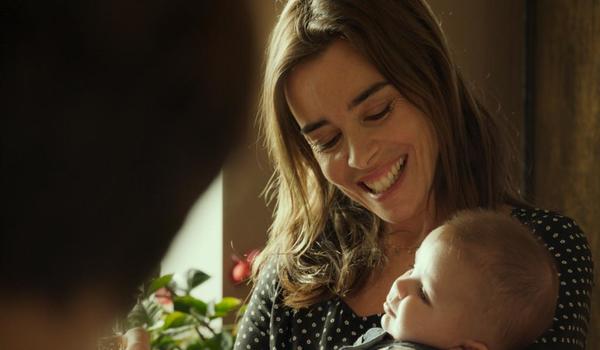
ÉLODIE BOUCHEZ AND "THÉO" IN IN SAFE HANDS
France's anonymous adoption system for newborns dramatized
Jeanne Herry's second feature In Safe Hands/Pupille, about France's anonymous adoption system for newborns, is one of several offerings in the 2019 New York Rendez-Vous with French Cinema series that relate to what can broadly be considered state social issues, along with Thomas Lilti's The Freshman/première année critiquing the state's ruthless system filtering out entrants into medical school and Invisibles, about a daytime shelter for homeless women. The French take their social services seriously and are particularly proud of their anonymous adoption system (called "l'accouchement sous X"). In Safe Hands is well researched, warmly acted, and intricately edited to interweave many strands, including mother, baby, nurses, doctors, social worker, foster parent, adoptive parents, and so on.
The caring comes through in the warmth of the performances, which most notably include the popular and often funny Sandrine Kiberlain as one of the caseworkers, GilleS Lellouche as the chosen foster parent for the three months awaiting adoption, and Élodie Bouchez, with that big smile of hers, as the now single adopting parent who has steadfastly waited out a nine year process.
It's hard to praise the construction of this movie too much. It tells its basic story well, and it provides backstories, or at least little details of the lives of each of its main characters. Jordan Mintzer isn't wrong in his Hollywood Reporter review, though, that the "thing" of Kiberlain's and Lellouche's characters is overdone, that there are a number of saccharine moments, and that the frequent closeups of the baby could fill a number of Huggies commercials. The dp Sofian El Fani did well nonetheless to show us people's emotions and give us closeups of the baby's changing emotional states, which are remarkable. (Who is this baby, one would like to know?) But the dp needn't have provided quite so many in-our-faces shaky-cam closeups of other objects.
First impression is the birth, then the careful social worker who explains things and takes note of the mother's wishes. She is a 21-year-old university student who became aware she was pregnant too late to do anything about it. But later, when "Théo" gives evidence to the temporary foster parent, Jean (Gilles Lellouche) that he may be shut down or limp, that there could be some problem, the receiving social worker is reluctant at fist to break the secrecy of her relation with the mother by revealing further information hat might be of urgent use.
Through several steps back in time the film shows us how Alice survived a long period of waiting, and then a postponement when she broke up with her partner and was automatically made to wait further to settle into single status (though the state had just okayed single-parent adoptions, allowing Alice a second chance eventually).
Key also are some bureaucratic sessions when various parties heatedly debate which adoption candidates or candidate will get to be the adoptive parent of Théo. Fur flies and foul words are used. But the sense is that there is passionate caring here, and that the system is working.
Much of this film could just be a TV special, except it's not, because the French are clearly willing to lavish some of their best talent on such material, and did so here. Pupille got seven César awards. Incidentally, the César Best Film winner was another picture about a social issue, an agonizing critique of a lax aspect of the French court "Juge d'Instruction" system in divorce custody situations seen in the RendezVous with French Cinema of 2018, Xavier Legrand's Custody.
In Safe Hands/Pupille, 109 mins., debuted at Angoulême, showing in six Francophone fests in late 2018. It opened in French, Swiss, and Belgian theaters 5 Dec. 2018 and got high marks from French Critics: AlloCine press rating 4.3. Screened for this review as part of the UniFrance-Film Society of Lincoln Center Rendez-Vous with French Cinema, Mar. 2019.
Monday, March 4, 6:15pm (Q&A with Élodie Bouchez)
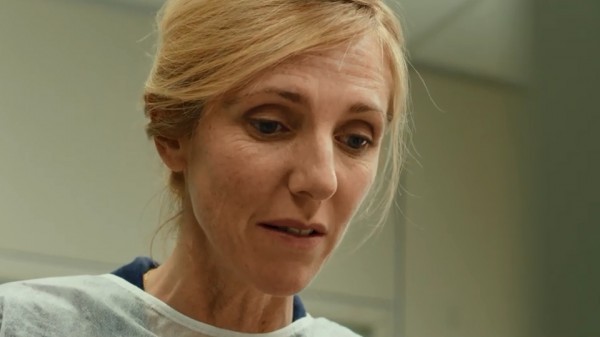
SANDRINE KIBERLAIN IN IN SAFE HANDS/PUPILLE
Last edited by Chris Knipp; 03-05-2019 at 08:16 PM.
-
THE SUMMER HOUSE/LES ESTIVANTS (Valeria Bruni Tedeschi 2018)
VALERIA BRUNI TEDESCHI: THE SUMMER HOUSE/LES ESTIVANTS (2018)
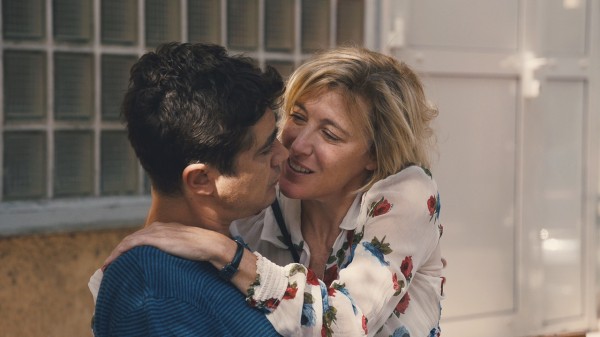
RICARDO SCAMARCIO, VALERIA BRUNI TEDESCHI IN THE SUMMER HOUSE
A Valeria Bruni Tedeschi family drama à la Chekhov, by Fellini
The Summer House/Les Estivants, the prolific actress Valeria Bruni Tedeschi's fourth feature, is perhaps her most complex and one of her best. And though she is constantly seen on stage and screen in French and Italian, in which she is equally fluent, and has 90 screen acting credits, she obviously cares very much about her relatively small number of directorial efforts, because they are so autobiographical, speaking much about her complicated Franco-Italian industrial family and usually incorporating family members into the cast.
Note that Bruni Tedeschi recently directed for television a version of Chekhov's Three Sisters (R-V 2016). The Summer House, an elaborate, full-dress, impressively cast and acted family gathering at the family summer place of a wealthy industrialist, with a sister Elena (Valeria Golino), mother Louisa (Marisa Borini), and adopted daughter on hand, has all the trappings of Chekhov and then some. These notably include Elena's older husband, the wealthy industrialist and lord of the manner who has fired thousands of employees (Pierre Arditi) This is like Chekhov by Bruni Tedeschi with staging by Fellini. And this is also self-reflective, because Anna, Bruni Tedeschi's character, is here working on a film - though in a comical preliminary scene including Frederick Wiseman as a board member it doesn't seem to have gotten the funding it sought - with her cowriter Nathalie (B.T.'s actual cosripter Noémie Lvovsky).
All members of Anna's complicated family seem to be on hand, including the director's own mother as her character's mother again, two actors competing apparently to play Anna's brother who died of AIDS (as did B.T.'s actual brother Virginio), and her brother's ghost (Stefano Cassetti) haunting the grounds. The film juggles a lot of subplots, including intense ones "downstairs," among the estate's household of staff, which include Yolande Moreau and François Négret. Also on hand is B.T.'s adopted African daughter Oumy Bruni Garrel, two members of the Comédie Française, Laurent Stocker and Bruno Raffaelli, and Italian heartthrob Riccardo Scamarcio as Luca, Anna's love, who is drifting away from her, standing in for her ex-husband Louis Garrel.
Late in the game there comes some nice diegetic music as a large older gentleman called Bruno (Bruno Raffaelli) sings German opera and lieder, with Louisa accompanying him on the piano.
The only taint on this enjoyable romp is how old-fashioned and derivative it is - in many respects. Bruni Tedeschi's own creation of Anna, a creative madwoman, driven crazy by by Luca's abandonment, is original with her. And as Luca, Scamarcio is both very physical and real, fleshy, dark and handsome with his flashing pale blue eyes, kissing her, smoking, and yet perhaps also imaginary some, or even all, of the time. All this is certainly sui generis. It's just the whole idea of the wealthy family summerhouse gathering of moody isolated planets that comes from the Russians, and the whole social setting of inherited wealth, with servants, an old house, is very vieux jeu - not to mention the fact that Burni Tedeschi has done this kind of thing herself, speaking about her own and her family's life, before.
But this familiarity does not keep The Summer House from entertaining, if you sit back and ride with the full extent of its meandering, anecdotal unfolding - though Jessica Kiang clearly did not, since in her Variety review she called this film "aggravatingly insular." (See however Boyd van Hoeij's more appreciative and more detailed review for Hollywood Reporter.)
The Summer House/Les Estivants, 122 mins., debuted at Venice (Out of Competition) Sept. 2018 and was shown in at least five other festivals, including Mumbai. French theatrical release began 30 Jan. 2019 (AlloCiné press rating 3.1). Screened for this review as part of the UniFrance-FSLC Rendez-Vous with French Cinema at Lincoln Center, Mar. 2019. U.S. Premiere.
Rendez-Vous showtimes:
Tuesday, March 5, 1:30pm
Friday, March 8, 6:00pm
Last edited by Chris Knipp; 03-06-2019 at 05:12 AM.
 Posting Permissions
Posting Permissions
- You may not post new threads
- You may not post replies
- You may not post attachments
- You may not edit your posts
-
Forum Rules





 Reply With Quote
Reply With Quote







Bookmarks